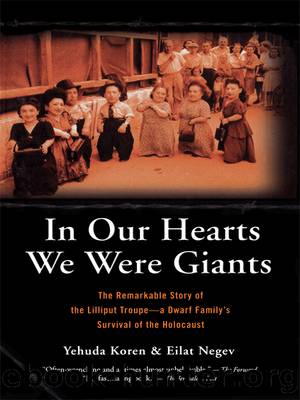In Our Hearts We Were Giants by Yehuda Koren

Author:Yehuda Koren
Language: eng
Format: epub
Publisher: Da Capo Press
Published: 2012-01-31T16:00:00+00:00
In the world of fairy tales, dwarfs always lived behind sieben Bergen—seven mountains—but Mengele was also punning here on the proper noun Siebenbürgen, the German name for Transylvania, the region the Ovitzes came from. Because the dwarfs tried hard to please him, Mengele composed another couplet for them:
Die ungarischen jüdischen Zwerge
geschützte Häftlinge.
The Hungarian Jewish dwarfs
Are excellent prisoners.
When Mengele asked them to sing for him, they were reluctant, as they were afraid of what the other inmates might think. “We don’t have our full orchestra with us,” they protested. “If I can sing a cappella, so can you,” Mengele answered, and to prove it he hummed a line from a Hungarian Gypsy song that had been making the rounds of the restaurants: “There’s Only One Girl in the World for Me.” His joviality somehow injecting confidence into them, for a moment they felt safe in his hands—protected, perhaps truly appreciated; and so they sang him one of their favorites: “Come Make Me Happy.”
One day while chatting with the dwarfs, Mengele let slip that ever since childhood he had loved the Grimm brothers’ “Snow White and the Seven Dwarfs.” Never, though, had he imagined the possibility of a real-life encounter with such a family. The similarities between the Ovitzes and the Grimms’ fiction intrigued him: the dwarfs in both instances numbering a symbolic seven; the group of diligent, happy dwarfs all living and working together, never separating. Disney’s Snow White had been a huge success in Hitler’s Germany, as well as the rest of Europe. In Disney’s animated film, the dwarfs had their own band, and they played instruments similar to those of the Ovitzes: guitar and accordion, bass and drums. Audiences loved the tale’s moral, in which the legendary dwarfs, living apart from society in the thick of the forest, have each—along with Snow White—discovered the benefits of mutual help. Disney’s dwarfs protected their princess and secured her future, while she attended to their daily needs.
Historically, in their traditional role as court jesters, dwarfs were the only subjects who dared speak their minds to the king without paying with their lives. Likewise, the Ovitzes played jesters to Mengele’s king. He thus became the ace card they could pull from their sleeves when they faced a serious problem. Having discovered his soft spot, the Ovitzes dared voice to Mengele their complaints; occasionally he acceded. Although Mengele’s cruelty remained manifest in the lack of mercy he showed in conducting his myriad tests, he nonetheless more than once rebuked the Kapos to save their lives. Such glimpses of a softer Mengele emboldened the Ovitzes, long exhausted by the endless medical probing, to try and make use of their special status. They mustered their courage, and, hoping against hope, elected Frieda to approach Mengele. “Forgive me for asking, Your Excellency, but when will this all be over so we can go home?” said Frieda, with all the charm she could conjure up. “What do you mean, meine Liebe? Don’t I have a family that I want to see? I can’t go home myself!” Mengele’s temper flared, and his voice rose.
Download
This site does not store any files on its server. We only index and link to content provided by other sites. Please contact the content providers to delete copyright contents if any and email us, we'll remove relevant links or contents immediately.
| Africa | Asia |
| Canadian | Europe |
| Holocaust | Latin America |
| Middle East | United States |
Fanny Burney by Claire Harman(25779)
Empire of the Sikhs by Patwant Singh(22167)
Out of India by Michael Foss(16310)
Leonardo da Vinci by Walter Isaacson(11897)
Small Great Things by Jodi Picoult(6089)
The Six Wives Of Henry VIII (WOMEN IN HISTORY) by Fraser Antonia(4786)
The Wind in My Hair by Masih Alinejad(4421)
The Lonely City by Olivia Laing(4113)
The Crown by Robert Lacey(4100)
A Higher Loyalty: Truth, Lies, and Leadership by James Comey(4028)
The Iron Duke by The Iron Duke(3637)
Millionaire: The Philanderer, Gambler, and Duelist Who Invented Modern Finance by Janet Gleeson(3566)
Sticky Fingers by Joe Hagan(3451)
Alive: The Story of the Andes Survivors by Piers Paul Read(3304)
Papillon (English) by Henri Charrière(3265)
Joan of Arc by Mary Gordon(3254)
Stalin by Stephen Kotkin(3082)
Aleister Crowley: The Biography by Tobias Churton(3016)
Ants Among Elephants by Sujatha Gidla(2922)
